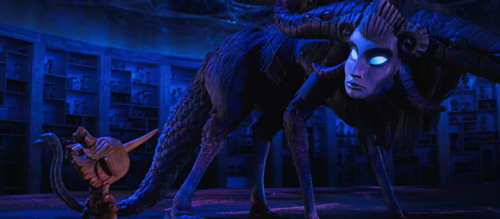 About 40 minutes into this latest take on Pinocchio you might be feeling like it’s a pretty standard re-telling of the story using the most labour-intensive form of animation there is. But then the wooden boy ends up in a kind of limbo, escorted by undead rabbits to an audience with the sphinx-like Angel of Death (Tilda Swinton), and you realise that only del Toro would tell the tale quite like this; Gothic and metaphysical. All versions of “Pinocchio” are about love and what it means to be human, but no other version is as explicitly about death and living with grief.
About 40 minutes into this latest take on Pinocchio you might be feeling like it’s a pretty standard re-telling of the story using the most labour-intensive form of animation there is. But then the wooden boy ends up in a kind of limbo, escorted by undead rabbits to an audience with the sphinx-like Angel of Death (Tilda Swinton), and you realise that only del Toro would tell the tale quite like this; Gothic and metaphysical. All versions of “Pinocchio” are about love and what it means to be human, but no other version is as explicitly about death and living with grief.
A debate that went semi-viral recently with the release of Henry Sellick’s Wendell & Wild was how little credit stop-motion directors receive compared to their big name collaborators who have also made live-action films. It’s known as Tim Burton’s The Nightmare Before Christmas because he conceived it and produced it, but many forget that Sellick was the director and was there every step of the way. While there’s little doubt that del Toro was more hands-on here than Burton ever was, you have to give credit to his co-director Mark Gustafson for the day-to-day guiding of the project and being an essential part of making the animation come to life.
As per usual with del Toro’s work, humanity is far more monstrous than anything otherworldly. The characters are a mixture of those from Collodi’s story (Pinocchio and Geppetto, the Cricket, Candlewick) and new creations to fit the time and place this version is set in. Ron Perlman’s sinister fascist officer Podestà not only serves the same story function as the Coachman from Collodi’s story but could also conceivably be the Italian cousin of Vidal from Pan’s Labyrinth, and Christoph Waltz’s creepy Mangiafuoco/Stromboli stand-in Count Volpe (a gleefully entertaining vocal performance) evokes every exploitative charlatan that profits in times of turmoil.
If there’s one major criticism you could level at this new Pinocchio, it’s that it tries to keep too many plates spinning in the air at once. Thank heavens that it’s not the bland, mass-produced product that was the recent Disney/Robert Zemeckis version, but it also occasionally loses sight of the pure heart and the sheer magic of the thing in its eagerness to make this version darker and more relevant to contemporary society. It is admittedly stronger when it’s being bleak and thoughtful as some of the jokes and certainly most of the songs don’t quite work (Sebastian’s is so bad it becomes a running gag that he keeps getting cut off right until the end credits).
Guillermo del Toro’s Pinocchio is a vivid and hard-hitting reimagining of a classic story that can’t be faulted for its boldness, ambition and beauty, but loses some of the story’s pure, timeless simplicity and childlike sense of wonder. It’s in a completely different league to the latest Disney version, but it is still Matteo Garronne’s authentic Italian take from 2019 that is the most definitive of the recent adaptations.
Score: 20/24

